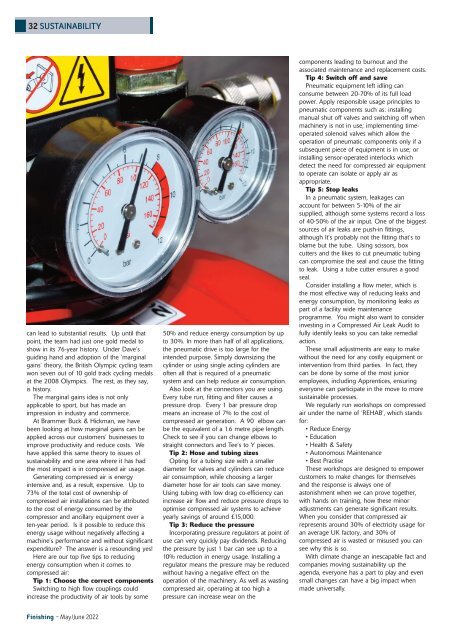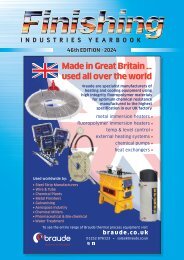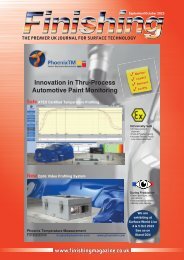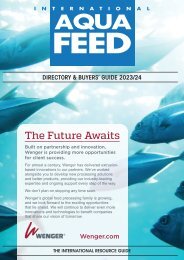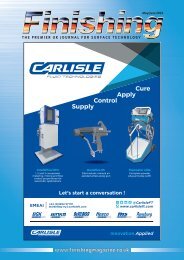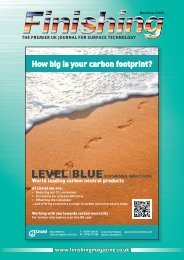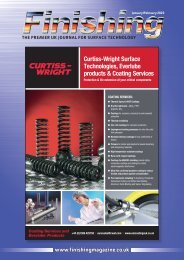You also want an ePaper? Increase the reach of your titles
YUMPU automatically turns print PDFs into web optimized ePapers that Google loves.
32 SUSTAINABILITY<br />
can lead to substantial results. Up until that<br />
point, the team had just one gold medal to<br />
show in its 76-year history. Under Dave’s<br />
guiding hand and adoption of the ‘marginal<br />
gains’ theory, the British Olympic cycling team<br />
won seven out of 10 gold track cycling medals<br />
at the 2008 Olympics. The rest, as they say,<br />
is history.<br />
The marginal gains idea is not only<br />
applicable to sport, but has made an<br />
impression in industry and commerce.<br />
At Brammer Buck & Hickman, we have<br />
been looking at how marginal gains can be<br />
applied across our customers’ businesses to<br />
improve productivity and reduce costs. We<br />
have applied this same theory to issues of<br />
sustainability and one area where it has had<br />
the most impact is in compressed air usage.<br />
Generating compressed air is energy<br />
intensive and, as a result, expensive. Up to<br />
73% of the total cost of ownership of<br />
compressed air installations can be attributed<br />
to the cost of energy consumed by the<br />
compressor and ancillary equipment over a<br />
ten-year period. Is it possible to reduce this<br />
energy usage without negatively affecting a<br />
machine’s performance and without significant<br />
expenditure? The answer is a resounding yes!<br />
Here are our top five tips to reducing<br />
energy consumption when it comes to<br />
compressed air:<br />
Tip 1: Choose the correct components<br />
Switching to high flow couplings could<br />
increase the productivity of air tools by some<br />
50% and reduce energy consumption by up<br />
to 30%. In more than half of all applications,<br />
the pneumatic drive is too large for the<br />
intended purpose. Simply downsizing the<br />
cylinder or using single acting cylinders are<br />
often all that is required of a pneumatic<br />
system and can help reduce air consumption.<br />
Also look at the connectors you are using.<br />
Every tube run, fitting and filter causes a<br />
pressure drop. Every 1 bar pressure drop<br />
means an increase of 7% to the cost of<br />
compressed air generation. A 90 elbow can<br />
be the equivalent of a 1.6 metre pipe length.<br />
Check to see if you can change elbows to<br />
straight connectors and Tee’s to Y pieces.<br />
Tip 2: Hose and tubing sizes<br />
Opting for a tubing size with a smaller<br />
diameter for valves and cylinders can reduce<br />
air consumption, while choosing a larger<br />
diameter hose for air tools can save money.<br />
Using tubing with low drag co-efficiency can<br />
increase air flow and reduce pressure drops to<br />
optimise compressed air systems to achieve<br />
yearly savings of around £15,000.<br />
Tip 3: Reduce the pressure<br />
Incorporating pressure regulators at point of<br />
use can very quickly pay dividends. Reducing<br />
the pressure by just 1 bar can see up to a<br />
10% reduction in energy usage. Installing a<br />
regulator means the pressure may be reduced<br />
without having a negative effect on the<br />
operation of the machinery. As well as wasting<br />
compressed air, operating at too high a<br />
pressure can increase wear on the<br />
components leading to burnout and the<br />
associated maintenance and replacement costs.<br />
Tip 4: Switch off and save<br />
Pneumatic equipment left idling can<br />
consume between 20-70% of its full load<br />
power. Apply responsible usage principles to<br />
pneumatic components such as: installing<br />
manual shut off valves and switching off when<br />
machinery is not in use; implementing timeoperated<br />
solenoid valves which allow the<br />
operation of pneumatic components only if a<br />
subsequent piece of equipment is in use; or<br />
installing sensor-operated interlocks which<br />
detect the need for compressed air equipment<br />
to operate can isolate or apply air as<br />
appropriate.<br />
Tip 5: Stop leaks<br />
In a pneumatic system, leakages can<br />
account for between 5-10% of the air<br />
supplied, although some systems record a loss<br />
of 40-50% of the air input. One of the biggest<br />
sources of air leaks are push-in fittings,<br />
although It’s probably not the fitting that’s to<br />
blame but the tube. Using scissors, box<br />
cutters and the likes to cut pneumatic tubing<br />
can compromise the seal and cause the fitting<br />
to leak. Using a tube cutter ensures a good<br />
seal.<br />
Consider installing a flow meter, which is<br />
the most effective way of reducing leaks and<br />
energy consumption, by monitoring leaks as<br />
part of a facility wide maintenance<br />
programme. You might also want to consider<br />
investing in a Compressed Air Leak Audit to<br />
fully identify leaks so you can take remedial<br />
action.<br />
These small adjustments are easy to make<br />
without the need for any costly equipment or<br />
intervention from third parties. In fact, they<br />
can be done by some of the most junior<br />
employees, including Apprentices, ensuring<br />
everyone can participate in the move to more<br />
sustainable processes.<br />
We regularly run workshops on compressed<br />
air under the name of ‘REHAB’, which stands<br />
for:<br />
• Reduce Energy<br />
• Education<br />
• Health & Safety<br />
• Autonomous Maintenance<br />
• Best Practise<br />
These workshops are designed to empower<br />
customers to make changes for themselves<br />
and the response is always one of<br />
astonishment when we can prove together,<br />
with hands on training, how these minor<br />
adjustments can generate significant results.<br />
When you consider that compressed air<br />
represents around 30% of electricity usage for<br />
an average UK factory, and 30% of<br />
compressed air is wasted or misused you can<br />
see why this is so.<br />
With climate change an inescapable fact and<br />
companies moving sustainability up the<br />
agenda, everyone has a part to play and even<br />
small changes can have a big impact when<br />
made universally.<br />
<strong>Finishing</strong> - <strong>May</strong>/<strong>June</strong> <strong>2022</strong>


